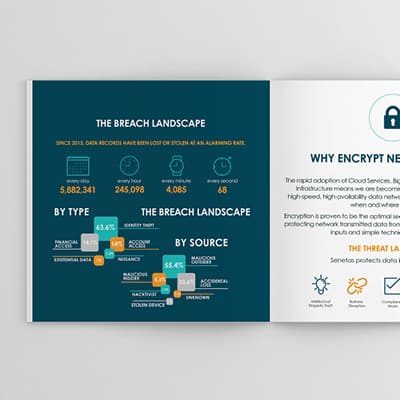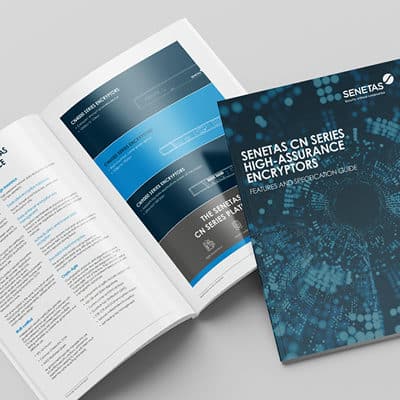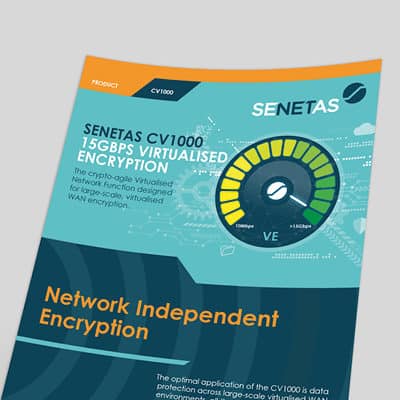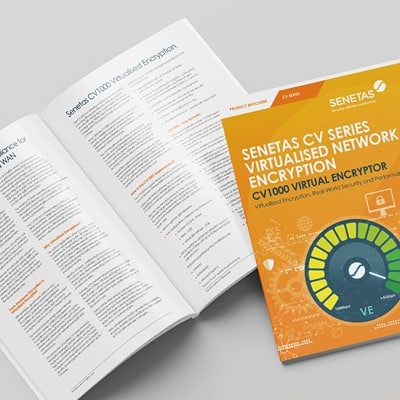Why is encryption important?
High-speed data networks are not inherently secure. Public and private network infrastructure is exposed to a multitude of cyber-threats and two thirds of all data theft occurs while it is moving across the network.
Network data security is at greatest risk when it contains sensitive, confidential or personally identifiable information. This is why encryption is important – it provides a secure layer for data in motion. The high data volumes (10Gbps+ links) involved in every day tasks represent an increasingly attractive proposition for cyber-criminals, as they seek financial gain from the data, or metadata, available to them.
For more information regarding the encryption of sensitive data across private or public networks, speak to one of our consultants today.
Encrypting network data
Understanding why encryption is important can make the difference, as not all encryption solutions are created equal. As we’ve seen from recent vendor announcements, embedded network/security devices and devices with “embedded encryption” are just not cutting it. If you want to protect your data, you should be using purpose-built, dedicated encryption solutions; either high-assurance hardware or a virtualized/software alternative.
The rapid growth of virtualisation, big data applications, Cloud and data centre services means we are becoming increasingly reliant on our high-speed/high-availability data networks to deliver information when and where we need it.
However, we often give little thought to where this data is travelling to, how it is stored, who may access it and what it’s been through in order to appear on our screens. Once your data leaves the perimeter of your protected systems you can’t be sure that it remains secure and doesn’t fall into the wrong hands.
When considering why encryption is important for network data protection, IT security professionals need to consider both the raw data source (video, text, voice etc) and the metadata associated with it. The advanced data analysis tools available today enable unauthorised users to interrogate and interpret high volumes of data, both in transit and at rest.
When you understand why encryption is important and choose to protect your network data, it’s crucial to know that not all encryption solutions are the same. Look for a solution that offers high-assurance data protection; a dedicated encryption device with secure key management that provides authenticated, end-to-end encryption.
The changing landscape of cyber-crime
Many network devices expose networks to data breaches. With the majority of IT security dedicated to protecting data at rest, cyber-criminals are focusing their attention on data in motion. A potentially rich source of sensitive or valuable information, data networks are seen as “low-hanging fruit” and are increasingly coming under attack.
Encrypting data in motion and using prevention technologies such as Firewalls, and embedded devices such as network switches and routers with “embedded security”, are not infallible. Understanding why encryption is important can help guard your sensitive data, even in the event of a data breach.
Remembering why encryption is important can guide your choice in encryption technology, as not all solutions are created equal. Your choice of encryption technology should be fit-for-purpose. If you want to ensure long-term protection beyond the useful life of the data, it needs to be purpose-built, dedicated hardware with the agility to adapt to evolving cyber-threats.
Over the past five years, an average of 18 million records have been lost or stolen every day.
The data was protected by encryption in just 4% of breach incidents.
Robust, high-assurance data encryption – the best, last line of defence
Protecting network-transmitted data against cyber attacks and data breaches has become a business imperative. Data network eavesdropping, innocent error or technical failure, data tampering and data theft have all become commonplace. Globally, the priority for government and commercial organisations is to ensure that network transmitted data is protected by robust encryption.
The implications of a significant breach are often catastrophic; not just for the profitability and reputation of an individual company, but for the security and safety of critical infrastructure, citizens, central government and emergency services.
Only encryption may ensure that your data remains protected while transmitted across data networks and links. However, not all encryption solutions are the same.
Robust network encryption (also known as high-assurance encryption) features secure, dedicated encryption devices. In order to be truly high assurance, these devices must use embedded, zero-touch encryption key management; provide end-to-end, authenticated encryption and use standards-based algorithms.
Understanding why encryption is important will assure you that only through high-assurance network data encryption can your data be rendered useless in unauthorised hands and remain secure beyond its useful life.
Our encryptors include small form-factor 10Mbps to 1Gbps devices; carrier-grade 1Gbps to 100Gbps and 10 x 1Gbps to 10 x 10Gbps multi-port rack-mounted units. They support all topologies, Ethernet and Fibre Channel protocols and SPB virtualisation. They operate in full-duplex mode at full line speed, with no packet loss.
Robust network encryption does not need to come at the expense of network availability and performance. The Senetas range of encryptors provides maximum data protection, without compromising performance, and offers a scalable solution, suitable for today’s multi-Layer network infrastructure.








